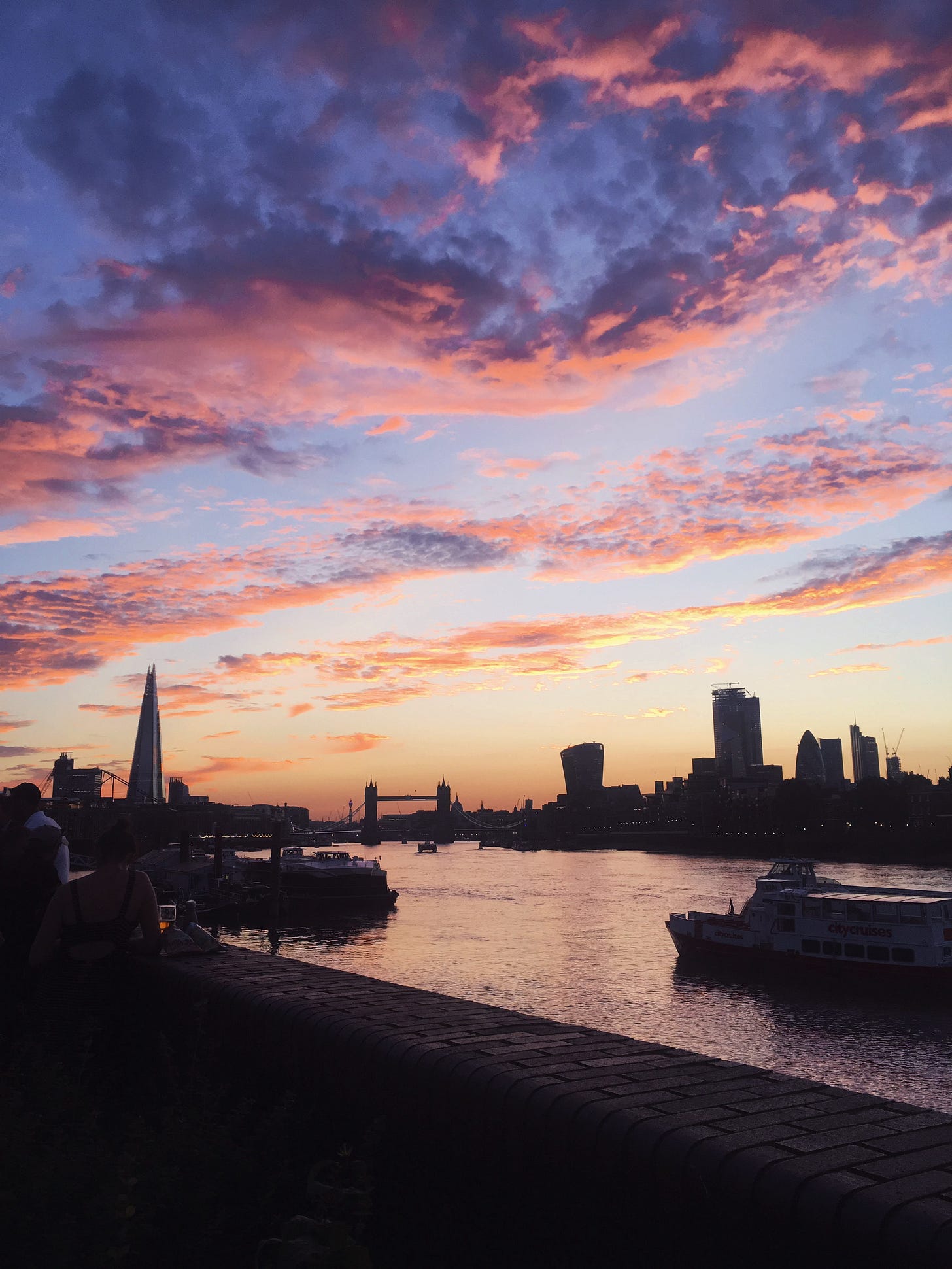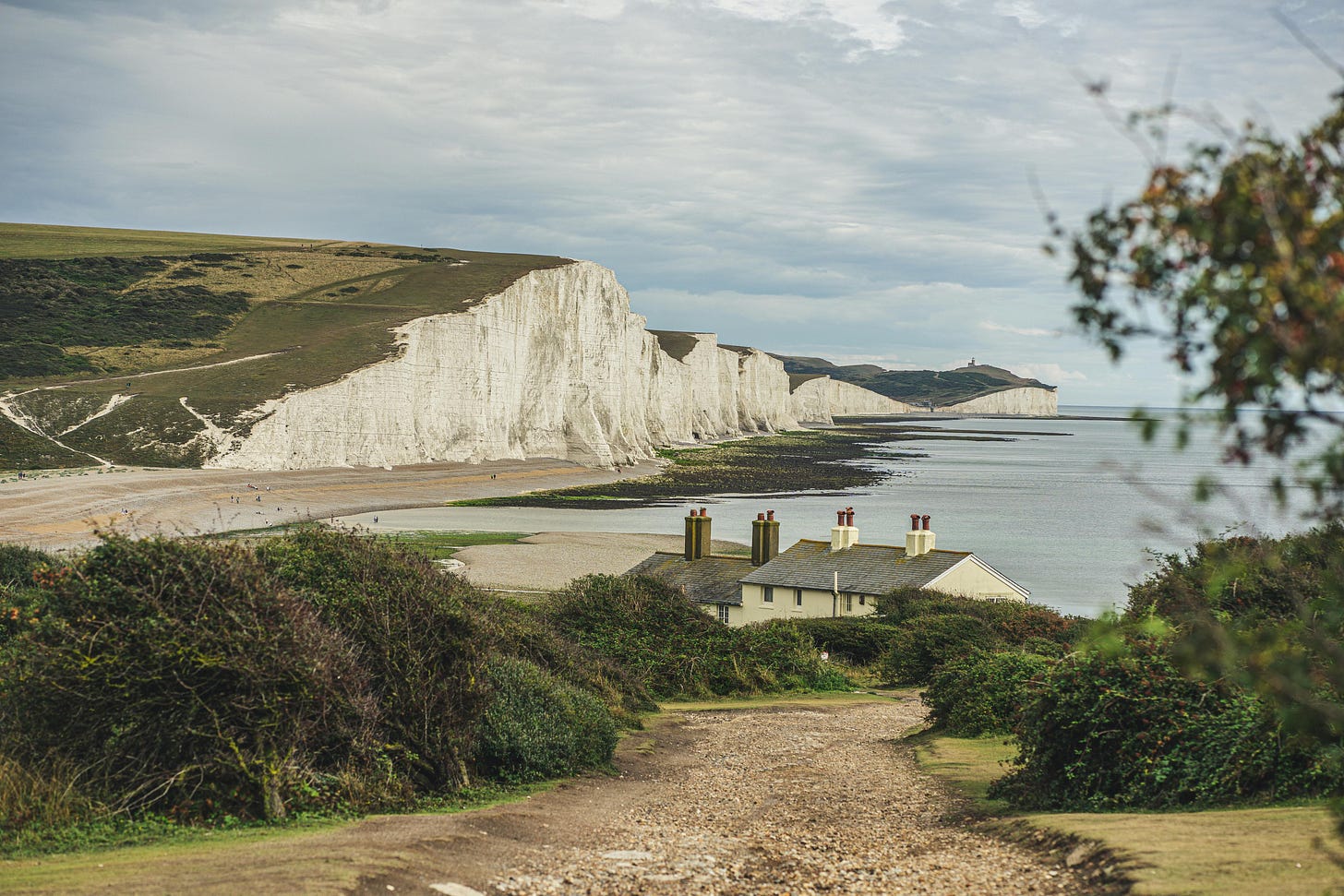Not where, but how to live
Finding home
When I left London after living there for nearly a decade, I was like a horse bolting out of its stable, chucking up great semi-circles of turf in the direction of Victoria Station with my hooves. Over many months, without consciously realising I was doing it, I’d created a monster of the city, associating it with everything that was making my life miserable: relationships that were giving me anxiety, my bank balance, the reason I felt so physically and mentally unhealthy. It was far easier to hang that heavy coat on London’s hanger than assess how each malady was allowed to continue, and what was really needed in order to do and feel better.
In turn, I’d also created a paradise out of my childhood home of Sussex, which admittedly isn’t hard to do. It is a kind of paradise for an outdoor-loving introvert who is close to their family and old friends. Miserable and anxious as I was back then, that idea of homecoming felt like transitioning back into the person I used to be, or knew I was capable of being. Vivacious, silly, creative, interested in life. But home couldn’t cure my unhappiness on its own, just as London couldn’t be blamed for its cause.
The other weekend, I was speaking to one of said childhood friends, Rachel, about the London homes we’d lived in. Like most people who have lived in the city for a long time, we’d burned through multiple houses and areas over the years, yanking wheelie suitcases and sad-looking cheese plants from borough to borough, usually at the mercy of some landlord. “Rank them,” said Rachel, as we sat in the Victoria in Dalston, sipping at wine our glasses before heading to a Halloween party. “Rank yours from best to worst.”
I found this task easy. The best was with Rachel and Hebe - two of my very closest friends - in New Cross back in 2015. It was my second London home, and objectively the shittest to the naked eye. We had a rat in our kitchen bin. We had no living room, just three bedrooms piled on top of each other (definitely illegal). It was deathly cold in winter and torturously hot in summer. There was once a human shit on our doorstep which we had to scoop up with a piece of old cardboard. That kind of thing. And yet, it was beautiful. A place compacted with love. A refuge during the desolate times, and a spotlit stage during the good. I would go on to live in much cleaner, fancier homes, but none ever achieved that ineffable feeling of home in the same way.
Being asked to rank them like that brought to mind something obvious, but unappreciated for me at least: that it’s not where, but how you live.
When I moved back in with my parents post-London, newly single, raw, different, and feeling a bit like I’d fallen out of the womb again, I began living in a way that inevitably made me happy. I saw my family more. I spent less money. I moved my body all the time. I was constantly immersed in nature. I only spent time with people who understood me and were kind to me. At the time, it made me want to shout “See!” up at London. “Look at how much better it is down here!” But with hindsight, it’s so obvious to me that the changes I made during that time were all my own, and - perhaps most importantly - that I could take credit for them, not the postcode.
Happily, that epiphany has allowed me to love London again. The majority of my friends still live there, and when I go up to visit them (which is at least once or twice a month), I relish the train journey, the autopilot I still adopt when I head to Hackney or Lewisham, the gorgeous diversity of human beings, the noise, the height, the unfocused shimmer of it all. I can easily see how someone could see the place as home, how returning to it could piece them back together and make them feel themselves again.

Yesterday, I was handed the keys to a beautiful new home on the cusp of Brighton and Hove. Though the keys were still handed to me by a landlord (such is life), it will be the first time I’ve ever lived alone, something which I’ve wanted to do since I was a child, and so feels quite monumental.
In an increasingly individualistic world, I think that feeling of home is both more precious and more precarious than ever, and I’ve found myself thinking about the concept not as something insular but something that stretches outwards. It’s one thing to be excited about the adventure of living alone and creating a cosy home for myself, but it’s far more exciting to me to think about what that means regarding my relationships with others. As I’m now lucky enough to be the bouncer of my own threshold, I want my home to be home to anyone who needs it. I want it to have that same promise of refuge that our New Cross house did. I want it to be a place people come to when they’re heartbroken or lonely. I want it to be somewhere that relaxes their nervous system.
It’s all connected, after all. The homes we cultivate in each other, and the ones we return to at the end of the day. The more the modern world coddles us towards individualism, the more necessary it is to push back against it. Leaving doors open. Sharing your space. Restoring the concept of neighbourhoods. These aren’t just physical acts, but ways of living, too.




